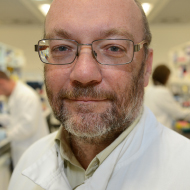Gene editing pioneer named director of the Roslin Institute

Professor Bruce Whitelaw has been named director of the Roslin Institute.
Gene-editing expert Professor Bruce Whitelaw has been named as Director of the Roslin Institute.
Professor Whitelaw, who is also chair of animal biotechnology at the University of Edinburgh, takes up the role after serving as interim director of the Roslin Institute since 2020.
Considered a pioneer in gene editing, he will head up a 500-strong team of scientists and professional support staff in world-leading research into animal bioscience.
Commenting on his appointment, Professor Whitelaw said: “I’m delighted to be appointed to lead Roslin in its next chapter of pioneering animal bioscience. I look forward to working with our world-class team, collaborators and supporters in making discoveries to understand and improve animal health, welfare and productivity – and by doing so, impactfully contribute to a sustainable animal agriculture future.”
Professor Whitelaw's career has centred on the development and application of gene activity in genetically-engineered livestock. His research aims to develop novel ways to tackle infectious diseases in animals, evaluate new ways to study potential treatments of human disease and enhance protein production in animals.
Professor David Argyle, head of the Royal (Dick) School of Veterinary Studies and Acting Head of the College of Medicine and Veterinary Medicine, said: “We congratulate Professor Whitelaw on his appointment as Director of the Roslin Institute, and look forward to working with him in his new role. His leadership and expertise will be of great benefit to the Roslin Institute and to the wider University.”



 The Veterinary Medicines Directorate (VMD) is inviting applications from veterinary students to attend a one-week extramural studies (EMS) placement in July 2026.
The Veterinary Medicines Directorate (VMD) is inviting applications from veterinary students to attend a one-week extramural studies (EMS) placement in July 2026.